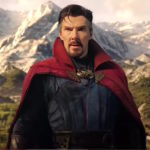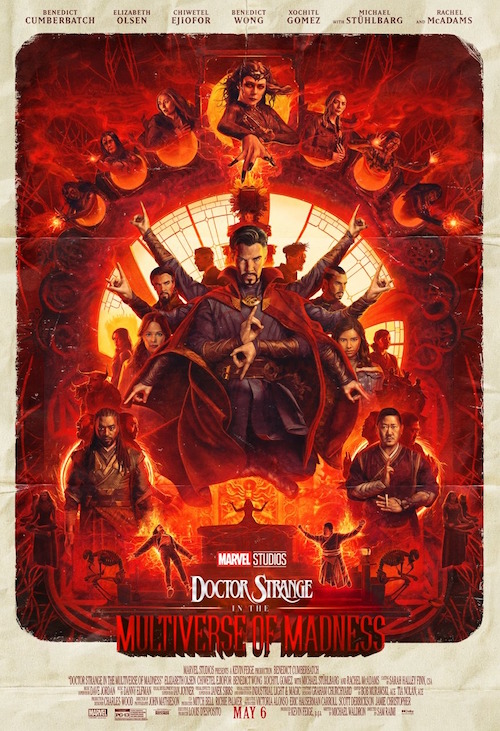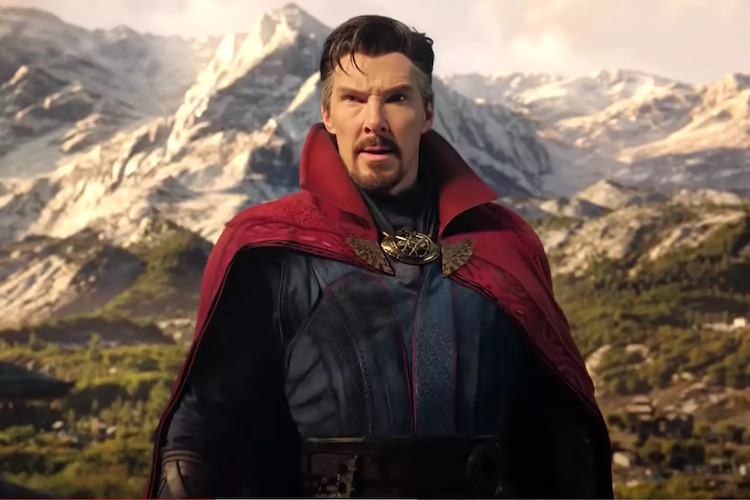The latest epic in the Marvel film canon, Doctor Strange in the Multiverse of Madness, delivers the goods on so many levels one might need the skill of the good doctor himself to be able to navigate them all effectively.
This time around, Stephen Strange finds himself pitted against an adversary intent on unlocking (and subsequently destabilizing) the Multiverse. To stop this cataclysmic event from occurring, Dr. Strange seeks the help of both old and new allies as he, himself traverses these alternate realities in an effort to restore order to the Multiverse.
Replacing Scott Derrickson (who helmed the first film in 2016) as director, Sam Raimi brings the “horror” vibe in spades to the table with this second film. Fans of Raimi’s “Evil Dead” films will be thrilled with the numerous nods (stay through until the end of the credits) to that series as well as the stylistic flourishes that now resonate through both series. Working from an extremely well-woven script by Michael Waldron (the creator of the Loki television series from 2021) that embraces everything that Raimi might be inclined to bring to the table, the director constructs a non-stop thrill ride that begins when the lights dim and carries on through until the end of the credits.
Reprising the role of Strange, Benedict Cumberbatch is all in on the raucous ride provided by Raimi and Waldron. There are countless incarnations of Strange that are introduced during the film and Cumberbatch gives each one a unique spin and twinge that perfectly encapsulates every individual character. Also returning from the 2016 film are Benedict Wong, Racel McAdams, and Chiwetel Ejiofor and each are afforded individual moments to steal the spotlight that gives the film a depth of character not seen in many films of this type.
Accompanying the good doctor on his travels through the Multiverse are America Chavez (Xochitl Gómez), a Multiverse traveler who may be the key to keeping all of the universes intact, and former Avenger Wanda Maximoff (Elizabeth Olsen). Along the way, Strange encounters alternate realities replete with heroes, villains, zombies, etc. that thoroughly test whether the viewer can retain their sanity as do the characters in the film.
The cinematography provided by John Mathieson gives the film the simultaneous appearance of both a Marvel film and a harder-edged “genre” picture that fuels the story and pace of the overall piece. Danny Elfman’s ethereal score imbues the film with that same otherworldly quality that all of the other elements in the film also underscore. The rapid-fire editing employed by Bob Murawski and Tia Nolan is the through line that guides the audience into and out of the Multiverse with ease and nary a scrape.
With Doctor Strange in the Multiverse of Madness, Marvel Studios has again reinvigorated the comic book film genre by allowing one of its universe’s most intriguing heroes to undertake its most original and riveting adventure yet.

| Producer: | Kevin Feige |
| Release Date: | May 6, 2022 |
| Running Time: | 126 minutes |
| Starring: | Benedict Cumberbatch, Elizabeth Olsen, Benedict Wong, Rachel McAdams, Chiwetel Ejiofor, Xochitl Gómez, Michael Stuhlbarg |
| User Rating: | |
| Writer: | Michael Waldron |
| MPAA Rating: | PG-13 (for intense sequences of violence and action, frightening images and some language) |
| Director: | Sam Raimi |
| Distributor: | Walt Disney Pictures |
| External Info: | Official Site / Facebook / Instagram / Twitter |


